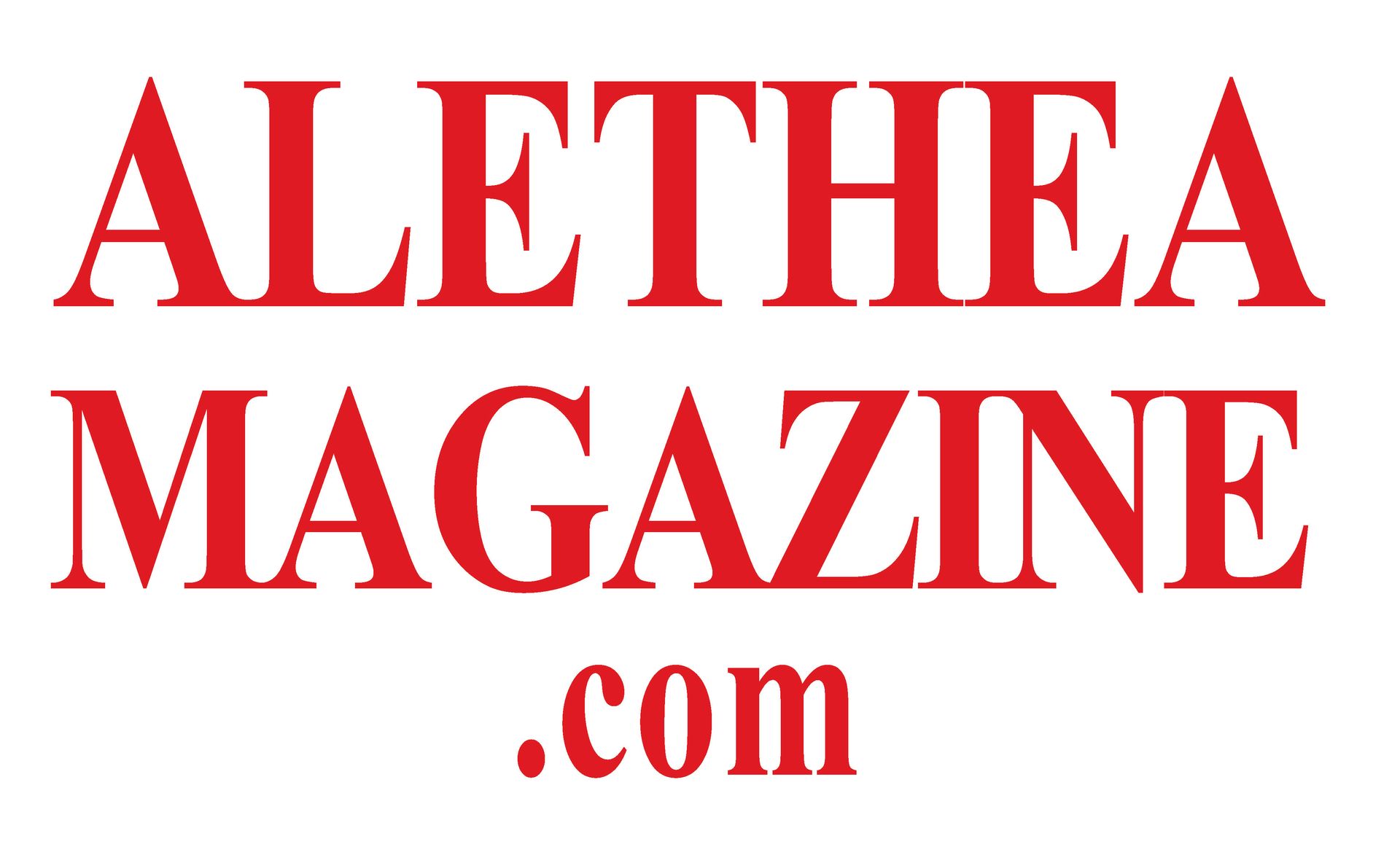Art Calendar / Art - 15 April 2022
Stephan Kaluza "Fiction / Non-Fiction" - Interview
Naturality versus Artificiality
8 to 30 April 2022 at Geuer & Geuer, Düsseldorf
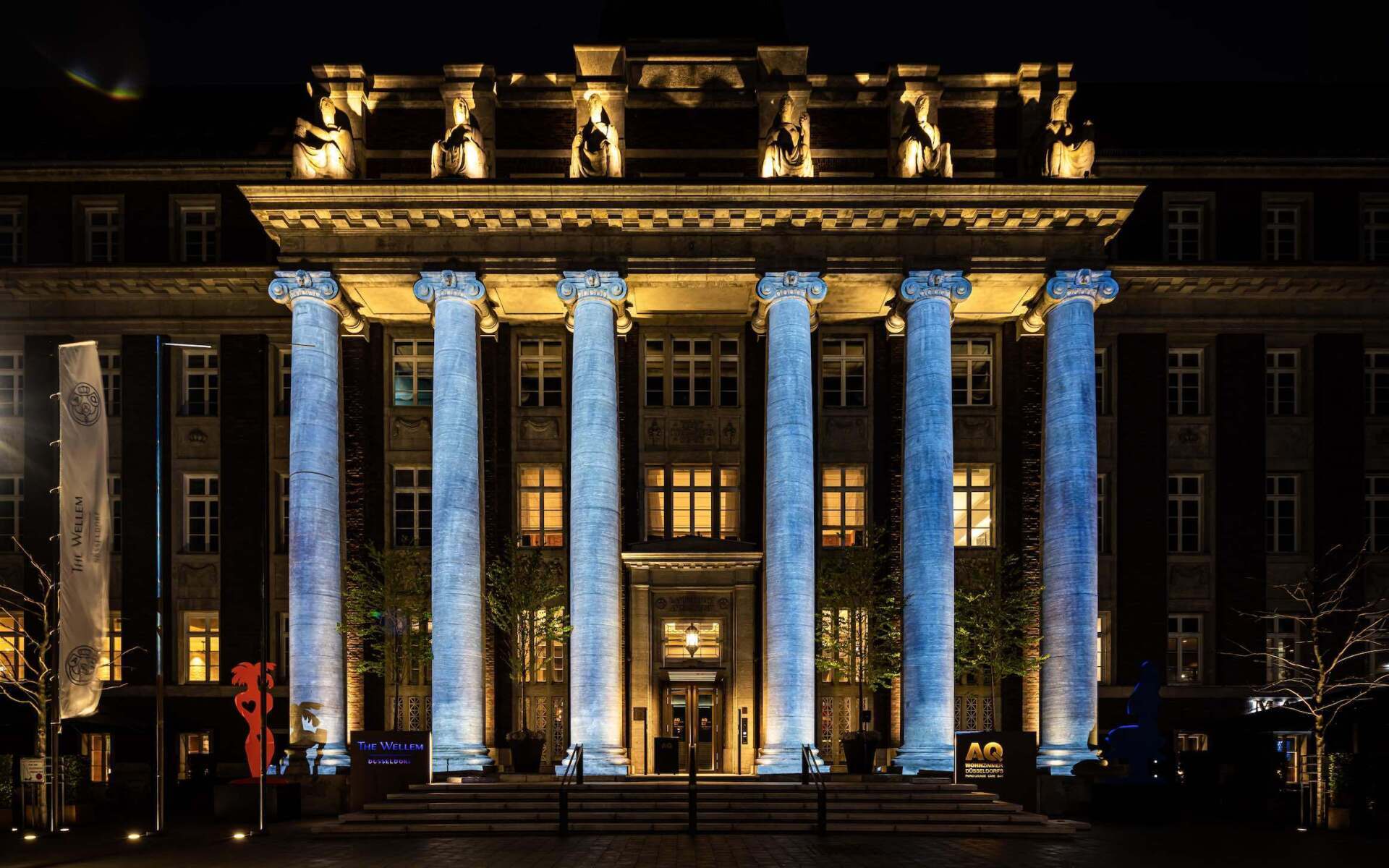
A waterfall by artist Stephan Kaluza that illuminated Düsseldorf's Designhotel The Wellem/Hyatt on the night of 8 and 9 April 2022. Two years earlier, he had installed a 100-metre-long and 2.30-metre-high Rhine photo collage there.
©Stephan Kaluza
"The cultural needs the natural to differentiate itself, to be able to be artificial at all; the natural, on the other hand, does not need the artificial to be able to be natural."
Stephan Kaluza
On the occasion of his exhibition "Fiction / Non-Fiction", the Düsseldorf artist Stephan Kaluza gave an interview to Alethea & Art Magazine. For the exhibition, the artist has put together two contrasting series: The Continuation of "Transit II" with new photorealistic paintings he has created over the last twelve months, and "Somnia", a series shown to the public for the first time. In "Somnia" the artist shows scenes from feature films paused to film stills.
---
From the simple and technical title "Transit II" one would not expect to stand in front of breathtakingly perfect paintings of nature, so beautifully painted that hardly any other artist would be able to paint them.
The series "Transit II" is meant to depict a transit situation of threatened nature. It is still portrayed as an idyll in the paintings. But the artist succeeds in presenting his paintings as a warning without any illustrative elements at all. Or is it the viewer who thinks of the threat to perfect nature through the beauty of the painting?
Natural philosophy is central to the artist's work. Thus he has launched his latest book - Stephan Kaluza - "Die Dritte Natur" - a volume of essays. This time, the artist is concerned with the art of nature as totality and idyll.
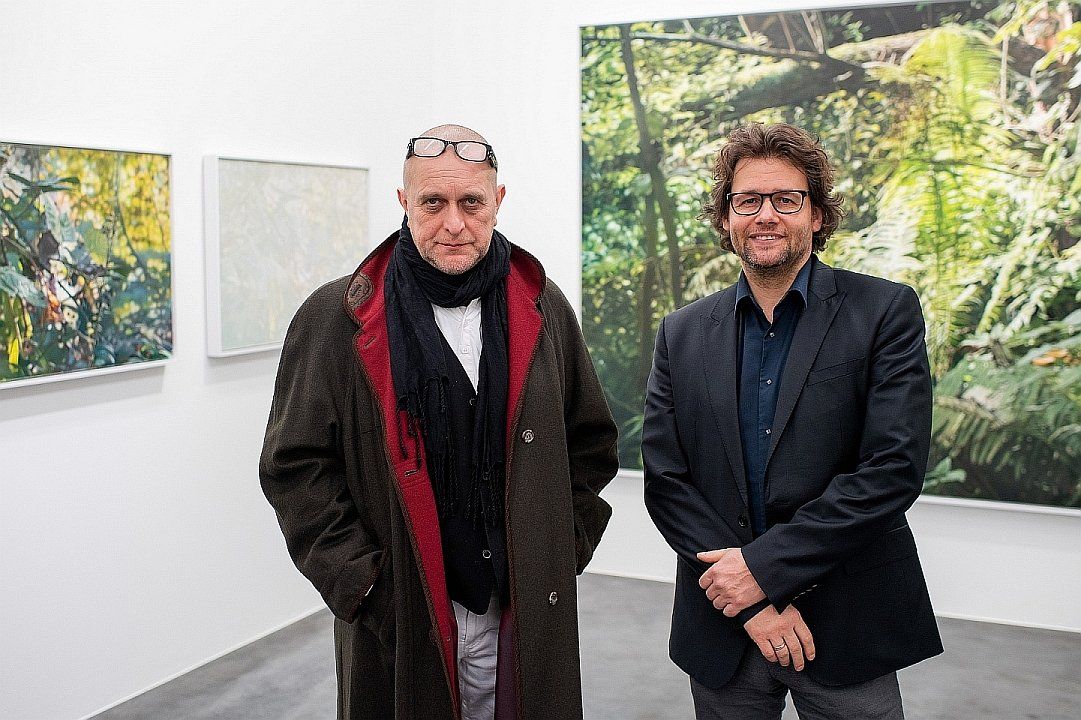
Stephan Kaluza and his galerist Dirk Geuer
©Geuer
To the interview:
Alethea & Art Magazine: What fascinates you so much about nature that you portray it in your works and books?
Stephan Kaluza: I come from Bad Iburg in the Teutoburg Forest, a small town with 10,000 souls, more trees than people. Nature has been my theme for many years, which also has something to do with my origins, because I live at times in a house in the middle of the forest. But nature is also a universal (?) theme for artists - art comes from nature and not from culture.
As a painter who works photorealistically, you imitate nature or do the same thing that nature does.
Alethea & Art Magazine: Are your paintings based on certain landscapes that exist in reality? What is the message of your series?
Stephan Kaluza: My nature paintings are created while painting, inspired by a real landscape. One painting was created by taking more than 20 different photos of the Teutoburg Forest. It depends on what these templates do to me.
My "Transit II" series refers to a transit situation, a threat, because the idyllic does not last. My paintings are an inventory of the idyll - but even without additional illustrative elements they can function as a warning.
The other series I am showing here, "Somnia", deals with artificial intelligence from feature films, games and the internet. Here, too, nature no longer appears natural at the time I paint it. Nature then becomes an artificial model.
Alethea & Art Magazine: In which landscapes were the paintings of the series "Transit II" created?
Stephan Kaluza: It doesn't matter to me where they were created, they were done in the Teutoburg Forest, in Thailand, on the Seychelles, in Africa and also on Martinique. What is essential is nature itself.
Alethea & Art Magazine: You also work as a book author and screenwriter.
Stephan Kaluza: I have written five novels, two non-fiction books and 20 plays so far. Much of it revolves around the theme of nature.
My current book - "Die Dritte Natur" ("Third Nature") is a collection of essays that deals with artificial nature as totality and idyll - the comparison of nature and culture.
I put forward the thesis that culture only became possible through the destruction of nature. Furthermore, I think that artistic work does not originate from culture, but from nature. It only becomes culture when the first results can be seen. The artistic process is a natural process and one can draw conclusions about nature itself. That is why my series of paintings "Somnia" contrasts with the series "Transit II", in order to juxtapose artificiality with nature here too.
In essence, it is about naturalness versus artificiality and what role an artist plays in it.
--
Stephan Kaluza "Fiction / Non-Fiction" - An Interview -
"Naturalness versus artificiality"
until 30 April 2022
at Geuer & Geuer, Düsseldorf
The series "Transit" and "Somnia" will be shown in the rooms of the gallery Geuer & Geuer as well as in the Andreas Quartiers.
The interview was held in german language
German version below
ALETHEA & ART MAGAZINE recommends:
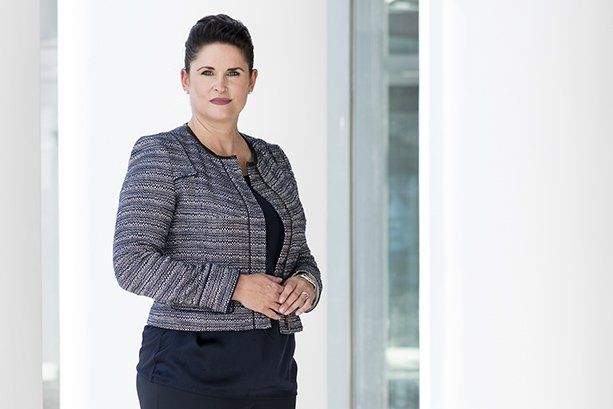
Art - Business - 6 April 2022
Art and art insurance in 2022 - art innovation leads to insurance innovation - an interview with Julia Ries, Head of ERGO Art & Values. NFT art insurance, environment social governance & sustainability in a $65.1bn market. According to the Global Art Market Report 2022, just released by UBS and Art Basel, the international art market recovered significantly in 2021 after having its sharpest sales decline in the last 10 years in 2020. Total sales of art by dealers and auction houses were estimated at $65.1 billion, a 29% increase in sales over 2020. The art market is undergoing a lot of change and so the question is how key players, such as art insurance companies, view this. Alethea & Art Magazine received an interview from Julia Ries, Head of ERGO Art & Values.
Julia Ries, Head of ERGO Art & Values ©Ergo

Business / Art / Fashion, 12 April 2022
The year 2022 for Swatch -
The man behind the design at Swatch is Carlo Giordanetti, member of the Swatch Product and Design Committee. He is also CEO of the Swatch Art Peace Hotel,
an artist residence in Shanghai.
Collaborations between brands and art abound - but what makes the collaboration between Swatch and the world of art so different, and why is it so fruitful? Alethea & Art Magazine interviewed Carlo Giordanetti at the launch of Swatch X Centre Pompidou in Paris to find out what role Swatch plays in the world of watches today, what sustainability measures the brand is taking and what his next plans are.
Photo: Carlo Giordanetti , member of the Swatch Product and Design Committee ©Swatch
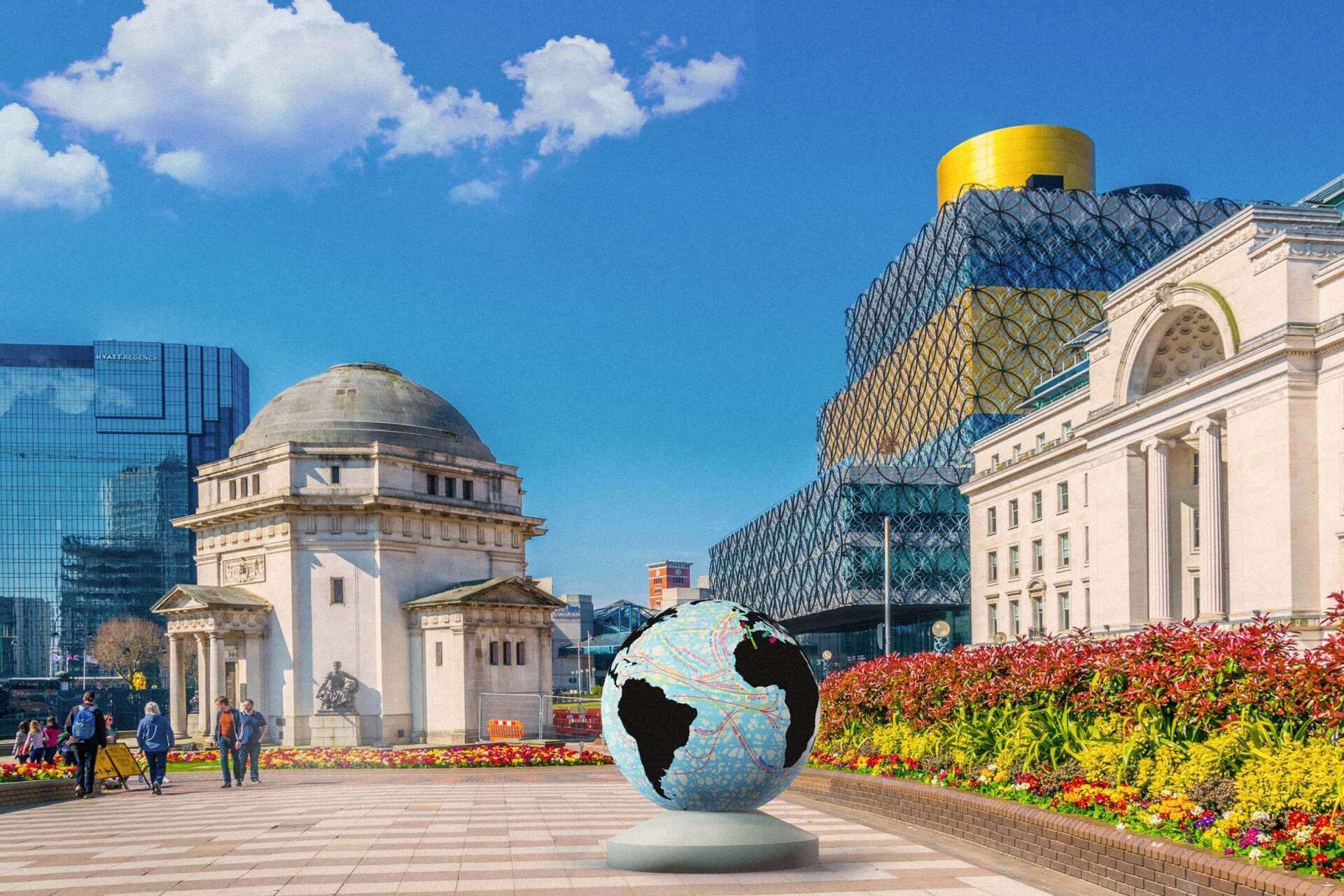
Art Calendar / Interview - 12 April 2022
The World Reimagined -
Interview with Ashley Shaw-Scott Adjaye - "Art is our greatest unifier"
A UK based arts education project designed to highlight the dimensions of the impact of the transatlantic slave trade in order to realise racial justice. Over 100 globe structures will be installed in seven UK cities from August to October 2022, created by
both established and undiscovered artists.
An interview with the artistic director of the project, Ashley Shaw-Scott Adjaye.
Yinka Shonibare - The World Reimagined - Globe Render
©Yinka Shonibare
Stephan Kaluza „Fiction / Non-Fiction“ - Interview -
Natürlichkeit gegen Künstlichkeit
8. bis 30. April 2022
bei Geuer & Geuer, Düsseldorf
"Die Natur braucht das Künstliche nicht um natürlich zu sein, aber das Künstliche/die Kultur braucht das Natürliche als antipodischer Gegenpunkt um eine Selbstberechtigung zu haben.“
Stephan Kaluza
Anlässlich seiner Ausstellung „Fiction / Non-Fiction“ gab der Düsseldorfer Künstler Stephan Kaluza Alethea & Art Magazine ein Interview. Für die Ausstellung hat der er 2 kontrastierende Serien zusammengestellt, die Fortsetzung von „Transit II“ mit neuen fotorealistischen Gemälden, die er in den letzten 12 Monaten geschaffen hat, sowie „Somnia“, eine Serie, die erstmals der Öffentlichkeit gezeigt wird. In „Somnia“ zeigt der Künstler zu Film-Stills angehaltene Szenen aus bekannten Spielfilmen.
---
Vom schlicht und technischen Titel „Transit II“ würde man nicht erwarten, vor atemberaubend perfekter Malerei von Natur zu stehen, so schön gemalt, wie kaum ein anderer Künstler in der Lage wäre, sie zu malen.
Die Serie „Transit II“ soll eine Durchgangssituation der bedrohten Natur darstellen. Noch wird sie in den Gemälden als Idyll dargestellt. Dem Künstler gelingt es aber, seine Gemälde ganz ohne illustrativen Elemente als Warnung darzustellen. Oder ist es der Betrachter, der durch die Schönheit des Gemälde an die Bedrohung der perfekten Natur denkt?
Naturphilosophie ist zentral im Werk des Künstlers verankert. So hat er sein neustes Buch auf der Markt gebracht - „Stephan Kaluza Die Dritte Natur“ - ein Essay Band in Ergänzung zu „Die Erste Natur“ und „Die Zweite Natur“ - dem Künstler geht es dieses Mal um die Kunst der Natur als Totale und Idyll.
Zum Interview
Alethea & Art Magazine: Was fasziniert Sie so sehr an der Natur, dass Sie in Ihren Werken und Büchern portraitieren?
Stephan Kaluza: Ich komme aus Bad Iburg im Teutoburger Wald, ein kleiner Ort mit 10.000 Seelen, mehr Bäume als Menschen. Natur ist seit vielen Jahren mein Thema, was auch mit meiner Herkunft zu tun hat, denn ich lebe zeitweise in einem Haus inmitten vom Wald. Natur ist aber auch ein universales Thema für Künstler - die Kunst kommt aus der Natur und nicht aus der Kultur.
Als Maler, der fotorealistisch arbeitet, ahmt man die Natur nach oder macht dasselbe, das auch die Natur tut.
Alethea & Art Magazine: Beruhen Ihre Gemälde auf bestimmten Landschaften, die es in der Wirklichkeit gibt? Was ist die Botschaft Ihrer Serie?
Stephan Kaluza: Meine Naturgemälde entstehen beim Malen, inspiriert von einer realen Landschaft. Ein Gemälde entstand durch über 20 verschiedene Fotos des Teutoburger Waldes. Es kommt darauf an, was das Foto mit mir macht.
Meine „Transit II“ Serie bezieht sich auf eine Durchgangssituation, eine Bedrohung, da das Idyllische nicht von Dauer ist. Meine Gemälde sind eine Bestandsaufnahme des Idylls - aber selbst ohne zusätzliche illustrative Elemente können sie als Warnung funktionieren.
Die andere Serie „Somnia“, die ich hier zeige, beschäftigt sich mit der künstlichen Intelligenz aus Spielfilmen, aus Games und aus dem Internet. Auch hier erscheint die Natur, die im Zeitpunkt, in der ich sie male nicht mehr naturell ist. Die Natur wird dann eine künstliche Vorlage.
Alethea & Art Magazine: In welchen Landschaften ist es entstanden?
Stephan Kaluza: Es spielt für mich keine Rolle, wo es entstanden ist, Sie sind im Teutoburger Wald, Thailand, Seychellen, Afrika und auch Martinique entstanden.
Alethea & Art Magazine: Sie arbeiten auch als Bücherautor und Drehbuchschreiber.
Stephan Kaluza: Ich habe bis jetzt 5 Romane, 2 Sachbücher und 20 Theaterstücke geschrieben. Vieles dreht sich um das Thema Natur.
Mein aktuelles Buch - „Die Dritte Natur“ ist ein Essays Band, in dem es um die Kunstnatur als Totale und Idyll geht - der Vergleich von Natur und Kultur.
Ich stelle hierin die Thesen auf, dass Kultur erst durch die Zerstörung der Natur möglich wurde. Ausserdem behaupte ich, dass das künstlerische Arbeiten nicht der Kultur entspringt sondern der Natur. Zur Kultur wird es erst, wenn erste Ergebnisse zu sehen sind. Der künstlerische Prozess ist ein natureller Prozess und man kann dabei Rückschlüsse ziehen auf die Natur selbst. Deshalb steht meine Bilderserie „Somnia“ der Serie „Transit II“ entgegen, um die Künstlichkeit der Natur gegenüber zustellen.
Im Kern geht es um Natürlichkeit gegen Künstlichkeit und welche Rolle ein Künstler darin spielt.
—-
Stephan Kaluza „Fiction / Non-Fiction“ - Interview - Natürlichkeit gegen Künstlichkeit
8. bis 30. April 2022
bei Geuer & Geuer, Düsseldorf
Die Serie Transit wird in den Räumen Geuer gezeigt, die andere Serie Insomnia teilweise bei Geuer und teilweise in den Ausstellungsräumen des Andreas Quartier.
